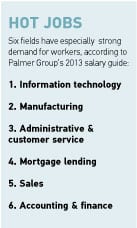2013 Year in Preview: HR & Education


Central Iowa companies are doing well and are hiring, said David Leto, executive vice president at Palmer Group.
He bases that opinion on the number of job openings with employers that Palmer Group serves.
“Employers are having vacancies to fill, and it’s a little bit harder than it used to be to find the right people,” he said.
The largest area of demand is in the information technology sector, where demand has reached an “all-time high,” according to the company’s 2013 salary guide. That is largely due to a national shortage of tech workers, Leto said,
Local officials have also identified a shortage of tech workers in Iowa. To remedy the problem, many Central Iowa employers are reaching out to colleges to try to make sure students know about the IT opportunities in the region. Organizations such as the Technology Association of Iowa and Greater Des Moines Partnership have also put programs in place to try to gain more IT workers on both a short- and long-term basis.
Other fields, such as manufacturing, sales and accounting and finance, are calling for more workers due to an improving economy.
Expect that to continue, Leto said.
“I think in Central Iowa we’ll continue to see improvement for sure (in the economy),” he said. “I think companies have positioned themselves well.”

Tops on the to-do list for human resources professionals this year: explaining changes in health insurance because of Obamacare.
It doesn’t help that businesses are, by and large, behind in preparing for reform, said John Hovey, president of Focus OneSource, a human resources management company.
Many businesses were waiting to see whether the Patient Protection and Affordable Care Act would be upheld by the Supreme Court.
It was.
Then they were waiting to see if President Barack Obama would be re-elected.
He was.
Now they are waiting on regulators to clarify the rules on how to comply with the legislation.
“I think it’s going to take a lot more to get up to speed,” Hovey said. “I think businesses are behind. … Employers are kind of waiting to see, ‘OK, I have to do it. How do I have to do it?’”
Two key things will be different this year. One, employers are to give employees a four-page, 12-point summary of benefits and coverage for their company plan.
Two, employers have to give employees information about state-run health exchanges. Gov. Terry Branstad said in December that Iowa would pursue a state-federal partnership in setting up the exchange.
The other health care-related issue for employers to keep in mind is that they will have to ramp up communication efforts to let employees know if there is an employer contribution to the health care plan, and if so, how much, Hovey said. Right now, he estimates one in 10 job applicants asks about benefit plans, but as people are required to purchase health care, it will become a more common question.

. . . Courtesy of Sarah Charlier, president-elect of the Central Iowa chapter of the Society for Human Resource Management and a human resource specialist with Merit Resources Inc.:
1. New rules for a mobile work force:
Because of employees’ increasing ability to work off-site using mobile devices, companies are grappling with issues related to data security. “The mobile device issue has really been pretty challenging for HR folks, in a work force that uses more mobile devices while still protecting your data,” Charlier said. “And deciding who owns the LinkedIn account or the Twitter account, and who is walking out the door with your data. Do you allow people to use their own devices, or do you buy them? A lot of organizations are trying to deal with that at this point.”
2. A wave of retirements:
As the Baby Boomer generation nears retirement, succession planning will become more important. Companies will need to focus on identifying employees who are going to stay with the company for the next several years to take over important roles, and not letting skilled and experienced people leave.
3. Legislative and legal changes:
As nationwide trends play out, businesses have to pay special attention to certain laws that differ by state. Employers with offices in Colorado and Washington state, for example, will have to figure out the HR ramifications of legalized marijuana. And in Iowa, employers must continue to figure out HR aspects of same-sex marriage, especially when it comes to federal programs such as COBRA health insurance.











